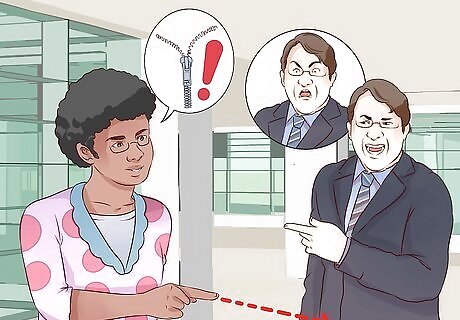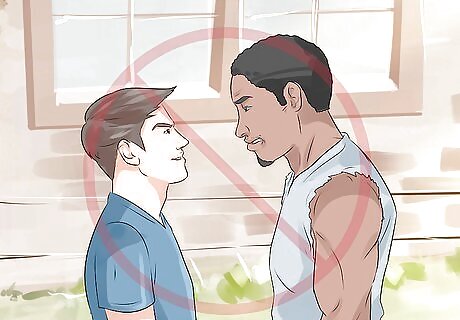
views
Handling Bullying Behavior

Avoid the bully whenever possible. If you are faced with a bully, one of the best strategies to use is removing yourself from the situation. Take a different route to class. Walk in a group where you are less likely to be singled out. If it is not possible to avoid the bully all together, make sure you are never alone with them. The bully may not want witnesses to the bad behavior so even taking the step to have another person with you may help to end the problem. Bullies target those they know that they can get a reaction out of, so don't make it obvious that you're avoiding them. If the bully is on social media, block the profile and remove any connections you share with them. Be aware, however, that the bully may create a new profile, so be careful when accepting new requests. Consider disabling comments on your social media accounts if the harassment continues.

Ignore any inappropriate behavior. A bully may call names or try to embarrass you, but ignoring the taunts may send the message that they will not be getting a reaction out of you. The bully will likely move on. This is going to be very hard to do in some cases, but think of it as a game and it may get easier Don't explain anything to the bully; chances are, they know that they're being ignored and why. Telling them this will only give them the satisfaction that they're bothering you.

Use humor. Making a joke at someone else’s expense is often the go-to behavior for a bully. You can take the sting out of this by simply laughing along. This approach also works if the bully uses sarcastic compliments to be mean. For example, instead of getting upset when they sarcastically tell you that you look nice, say “Why, thanks, Bethany!” as nicely as you can and walk away. Using humor may seem odd, but if the bully sees you don't care or don't “get” you're being made fun of, the jokes will stop.

Confront someone with whom you spend time with regularly. If you are being bullied by a coworker or a family member whom you interact with frequently, you need to speak with this person privately about their behavior. Talk to the bully in private but not in complete isolation. For example, talk to them in the breakroom at work, rather than in the back parking lot. Enlist the help of another co-worker, if you're at work, who can be close by if needed to get help. Mention the behavior, but don't tell the bully that it makes you feel bad. For example, say “The taunting is disrupting my day. I’d appreciate it if you stopped.” Also, if you say anything about going to HR if this is at work, be ready to do just that. Sticking up for yourself when it is safe to do so may not undo what the bully has already done, but it will help in preserving your sense of self-respect.
Choosing to Not Be a Victim

Remain calm. Bullies often target people they know they can get a rise out of. Do not give the bully what they want. Take a deep breath and continue on with what you were doing, or walk away. It might help to repeat a mantra in your head to maintain your calm in the face of a bully. Repeat something like “Don’t give them a reaction” or “Keep it cool.”

Be mindful of your physical and emotional reaction. Studies show that people are less likely to get teased or bullied if they exhibit an assertive attitude. You can stop being a victim to bullying by changing your reaction. Beware of your body language. Lift your chin, keep your back straight, and pull your shoulders back. Remaining aware and in control of your body will also help you remain calm and clear-headed. If showing strong, positive signals doesn’t come naturally, practice your assertive attitude at home while you’re away from the bully. If you have friends that you trust, consider asking them to help and advice. Have them point out when you're lacking confidence or when you're being assertive.

Document any offenses. Keeping a record of the bully’s taunts will help you to keep dates straight and establish a pattern. You will need to establish a pattern if this goes further and you report the behavior to a boss at work or the police if this is a domestic situation that you need help for. Save emails and take screenshots of social media comments right away. If you wait too long, the bully may delete them.

Speak to a superior or someone who can help. Make sure this conversation includes a clear picture of the pattern and any documentation. If you are at school, you can tell an instructor or a school administrator. If this is at work, go to the meeting with suggestions as to how this can be fixed. This might include moving the bully to a different department or working with HR. Be prepared to answer what you want to have happen. If you meet with the person at work face-to-face, follow up with an email documenting when the meeting took place and follow ups so you have it in writing what occurred. This will be included in the documentation if the behavior continues.
Avoiding Bullying Traps

Refuse to take bullying behavior personally. The behavior, no matter how personal of an attack that is used, is never about you. It’s about the need of the bully to get attention or to perseverate behaviors picked up elsewhere. Understanding a bully's motive may help you realize that their behavior is not personal. For example, they could just feel jealous or threatened. Remember, you’re not doing anything wrong—it’s not about you.

Don’t reciprocate bullying behavior. This probably is not the first time the bully has acted like this so they are probably pretty good at it. You do not want to open yourself up to a situation where the only behavior anyone sees is your reaction and you get into trouble. Don't bully back online. If the bully deletes their content, it will look like you are the one who did all the bullying! Responding with anger doesn't help. "I am dealing with a family member who has been disrupting the family. He had a big blow-up last night and everyone's anger was building. A family counselor told us that he was a bully and we were responding to him with anger which wasn't helping. Things have changed now that we understand how to communicate with him." - Patrick U. Bullies are selfish. "This article inspired me to gather the courage to attend a family event tonight, despite my daughter and I being bullied by members of our family. I now know that I don't have to exist under their control and they just wish to rob me of these precious moments in order to feel victorious." - Raymond T. Did you know that wikiHow has collected over 365,000 reader stories since it started in 2005? We’d love to hear from you! Share your story here.

Refrain from getting into a physical altercation. Becoming physical with a bully should be avoided at all costs. Whether you are at school, work, or in another environment, getting into an altercation can mean being arrested and charged with assault. Physical self-defense should only be used as a last resort when required to protect yourself from the other person. Try to avoid this if you can.

Choose not to allow yourself to become isolated by a bully. The bully may choose to intimidate you to the point that you feel like there’s no one you can turn to. Share the experience with others. See a counselor. Deny this person the opportunity to steal away your voice.




















Comments
0 comment